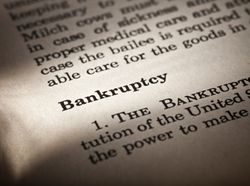 Yes it is possible for one spouse to file bankruptcy and the other not to file. This may beneficial in some cases, such as when the bulk of the debt is in one spouse’s name only. Be advised, however, that if the non-filing spouse is a co-debtor on a secured debt, the non-filing spouse will still be liable for such debt. Also, the spouse’s income must be disclosed and considered in the bankruptcy. Deciding if both spouses or just one spouse should file bankruptcy involves an in-depth legal analysis and should not be taken lightly. A Jacksonville bankruptcy attorney can advise you if filing with one spouse only is the best legal strategy for you.
Yes it is possible for one spouse to file bankruptcy and the other not to file. This may beneficial in some cases, such as when the bulk of the debt is in one spouse’s name only. Be advised, however, that if the non-filing spouse is a co-debtor on a secured debt, the non-filing spouse will still be liable for such debt. Also, the spouse’s income must be disclosed and considered in the bankruptcy. Deciding if both spouses or just one spouse should file bankruptcy involves an in-depth legal analysis and should not be taken lightly. A Jacksonville bankruptcy attorney can advise you if filing with one spouse only is the best legal strategy for you.
Articles Posted in Chapter 7
Is There a Way To Get Student Loans Discharged in Bankruptcy?
Yes, there is, but it is extremely difficult and rare. Student loans are classified as non-dischargeable debt, meaning that they are still due even after filing bankruptcy. However, there is a way to get the court to discharge them: prove undo hardship. To do this, you must convince the court that you cannot maintain a minimum standard of living and also repay your student loans at the same time, your current bad financial situation is extremely likely to continue, and that you have made an honest effort to pay off the student loans. Although this is theoretically possible, it is very rarely granted by the court. A court might consider this route if you are permanently and totally disabled.
If you have questions about whether your situation might warrant a student loan debt discharge, contact a Florida bankruptcy attorney to discuss your case.
What Is Credit Counseling and Do I Have To Do It To File Bankruptcy?
A new law that came out in 2005, the Bankruptcy Abuse Prevention and Consumer Protection Act, requires consumers that file for bankruptcy to complete credit counseling within the 6 months prior to filing. This is a program that can be done online, in person, or over the phone. You can search the Internet for a provider. Also, there is usually a free course given once per month at the Federal Courthouse. Once you have completed the course, the provider will email or fax a Certificate of Credit Counseling to your Jacksonville bankruptcy attorney. Your The date you completed your credit counseling must be before your petition is filed.
There is also a second education requirement when filing bankruptcy, the Certificate of Debtor Education. This is very similar to the credit counseling but this one must be done after you file your bankruptcy. You must fulfill this requirement before the court will grant you a discharge. So for a Chapter 7, the debtor education must be completed within 60 days of your 341 meeting of creditors. For a chapter 13, the debtor education requirement must be completed before the last payment under your Plan is due, so this could be up to five years.
What is the Fair Debt Collection Practices Act?
The Fair Debt Collection Practices Act (FDCPA) is an Act that Congress passed in response to a growing number of abusive collection practices used by collection agencies. The FDCPA provides guidelines that creditors must follow when trying to collect debts from consumers. This Act applies to debt collectors. A debt collector is defined as any person who regularly collects debts that are owed to others. This act also applies to attorney collectors but in-house collections are not covered.
If the collection department from your favorite store is contacting you regarding your credit card with them, they are not restricted by the FDCPA, but they are governed by the Florida Consumer Collection Practices Act. However, if that same store used an outside collection agency, that agency is governed by the FDCPA.
Some restrictions that the FDCPA puts on debt collectors are:
Proposed Bankruptcy Foreclosure Mediation Bill Advances
Mortgage Delinquency Rate Falls to Lowest Level Since 2008
 According to the latest statistics from the Mortgage Bankers Association (MBA), the mortgage delinquency rate on single-family homes fell to its lowest rate since the fourth quarter of 2008, falling to 8.22% for the fourth quarter 2010. The MBA’s chief economist, Jay Brinkmann, said the fourth quarter stats represent “significant across-the-board” decreases in delinquent mortgages in the U.S. Mortgages one payment behind have fallen to late 2007 levels and loans three payments behind have dropped to the lowest levels of 2010.
According to the latest statistics from the Mortgage Bankers Association (MBA), the mortgage delinquency rate on single-family homes fell to its lowest rate since the fourth quarter of 2008, falling to 8.22% for the fourth quarter 2010. The MBA’s chief economist, Jay Brinkmann, said the fourth quarter stats represent “significant across-the-board” decreases in delinquent mortgages in the U.S. Mortgages one payment behind have fallen to late 2007 levels and loans three payments behind have dropped to the lowest levels of 2010.
The MBA delinquency statistics do not include the mortgages that have already received a foreclosure filing but Brinkman noted that “every state but two (North Dakota and Arkansas) saw a drop in the 90-lus day delinquency rate and the two increases were negligible.” The number of loans in foreclosure or are at least one payment past due was 13.56%, a significant decline from the third quarter 2010 numbers.
Brinkman stated that the improvement in the delinquency rate should be attributed to the improvement in individual earnings due to the increase in private sector job growth and that “absent a significant economic reversal, the delinquency picture should continue to improve during 2011. If you are already facing a Florida Foreclosure Lawsuit or are delinquent on you mortgage loan, contact a bankruptcy Lawyer to see what foreclosure alternative options may be available to you.
Man facing Foreclosure hires another to burn down his House!
 According to Davidson County Sheriff David Grice, a Denton, NC man facing foreclosure hired a Virginia man to burn his house in order to collect the insurance money. The fire occurred on August 16 and fire investigators became suspicious of foul play when they learned that a flammable liquid had been used to start the fire. During the course of their investigation, police and fire officials were able to determine that the homeowner hired the other man to burn his home down before the bank repossessed it.
According to Davidson County Sheriff David Grice, a Denton, NC man facing foreclosure hired a Virginia man to burn his house in order to collect the insurance money. The fire occurred on August 16 and fire investigators became suspicious of foul play when they learned that a flammable liquid had been used to start the fire. During the course of their investigation, police and fire officials were able to determine that the homeowner hired the other man to burn his home down before the bank repossessed it.
Police have arrested and charged the Virginia man with second-degree arson and homeowner has been charged with conspiracy to commit arson and conspiracy to commit insurance fraud. The home owner’s mother, who drove the Virginia man to the home in order to start the fire, has also been charged with conspiracy to commit insurance fraud for her role in the episode.
This is not the most effective way for homeowners to avoid a foreclosure lawsuit. If you are facing a Florida Foreclosure Lawsuit
What is a Deficiency Judgment in terms of Foreclosure and Bankruptcy?
 Jacksonville homes underwater. This is a question that we hear often as Jacksonville Bankruptcy and Florida Foreclosure Lawyers. In short, a deficiency judgment is a judgment for a debt that is owed after a foreclosure, i.e. the amount of money the bank was not able to recover after it forecloses on a home. Lenders are even allowed to add interest, fees and other expenses to that amount as long as their is an outstanding deficiency. While some states have laws that prevent lenders from seeking deficiency judgments, Florida is one of the states that does allow deficiency judgments to be pursued.
Jacksonville homes underwater. This is a question that we hear often as Jacksonville Bankruptcy and Florida Foreclosure Lawyers. In short, a deficiency judgment is a judgment for a debt that is owed after a foreclosure, i.e. the amount of money the bank was not able to recover after it forecloses on a home. Lenders are even allowed to add interest, fees and other expenses to that amount as long as their is an outstanding deficiency. While some states have laws that prevent lenders from seeking deficiency judgments, Florida is one of the states that does allow deficiency judgments to be pursued.
It is possible that there may not be a monetary shortfall after a lender has taken and sold a home through foreclosure but that is becoming less and less likely as national home prices have continued to decline. This may seem like a no-win situation for a homeowner but there are alternatives that homeowners can pursue to avoid a deficiency judgment. Foreclosure alternatives such as short sales, deeds-in-lieu, and loan modifications are just a few of the ways a Jacksonville Foreclosure Lawyer may use to help homeowners avoid deficiency judgments.
If you are one of the thousands of Florida homeowners who are facing a Foreclosure Lawsuit and potentially a deficiency judgment, give us a call to explore your potential foreclosure alternatives.
 Jacksonville Bankruptcy Lawyer Blog
Jacksonville Bankruptcy Lawyer Blog


